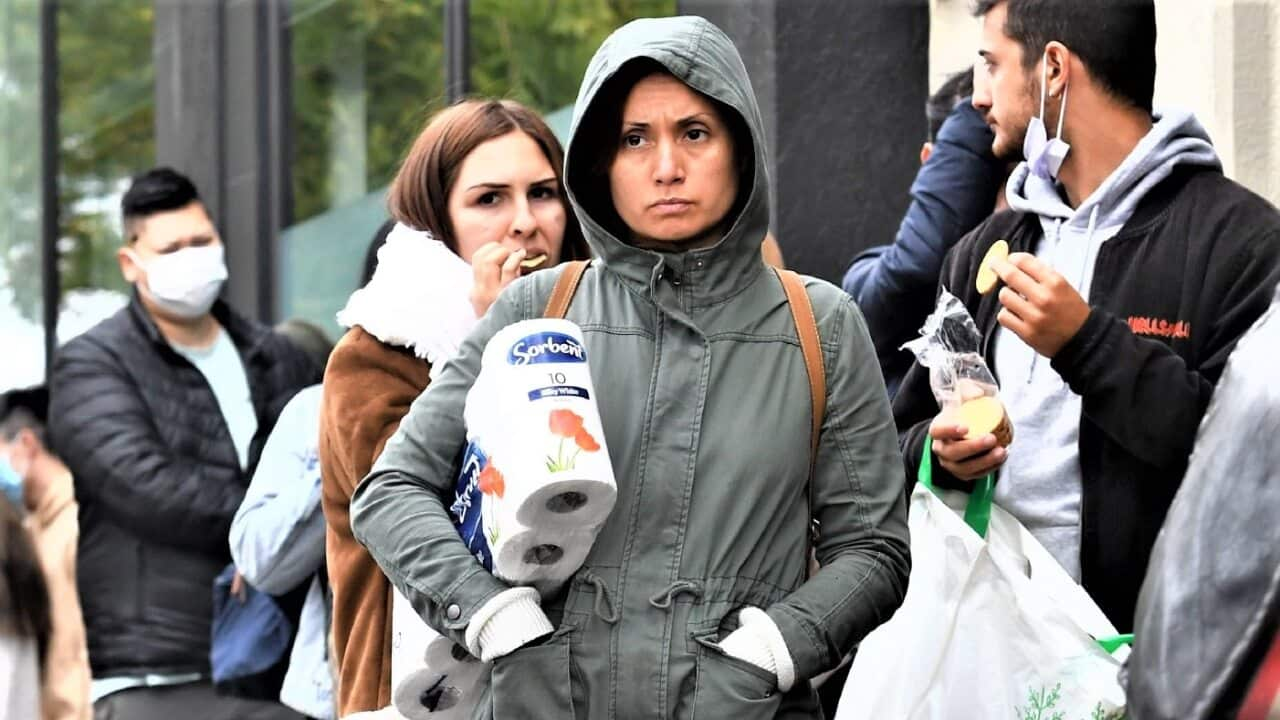Almost one in 10 Australians will be unemployed by Christmas as the coronavirus pandemic continues to deeply impact workers and their families.
Treasurer Josh Frydenberg issued the forecast in the July Economic and Fiscal Update, which confirmed the nation is facing its biggest budget deficit since World War II. Mr Frydenberg said the official jobless rate will peak at 9.25 in the December quarter, leaving an additional 240,000 people out of work.
Mr Frydenberg said the official jobless rate will peak at 9.25 in the December quarter, leaving an additional 240,000 people out of work.

Treasurer Josh Frydenberg addresses the media during a federal budget update. Source: AAP
"These harsh numbers reflect the harsh reality we face," Treasurer Josh Frydenberg told reporters in Canberra.
"These are mums and dads, sons and daughters, friends and colleagues."
Between March and May 870,000 jobs were lost as coronavirus lockdowns devastated businesses. Another million Australians had their working hours reduced - in many cases to zero.
The current unemployment rate sits at a 22-year high of 7.4 per cent with some 992,000 people out of work. Mr Frydenberg warned unemployment would remain at elevated levels into early next year, but said the government's response had helped limit the damage.
Mr Frydenberg warned unemployment would remain at elevated levels into early next year, but said the government's response had helped limit the damage.

Unemployment is expected to peak at nine and a quarter per cent. Source: AAP
“Without the government's economic support measures, unemployment would have peaked at five percentage points higher,” he said.
“The government's economic measures have saved 700,000 jobs.”
The federal government’s JobKeeper program has provided $1,500 wage subsidies to some 3.5 million workers keeping them connected with their employer.
While, JobSeeker payments for the unemployed during the pandemic have been boosted by the $550 coronavirus supplement.
But these supports are set to continue at reduced levels beyond September as the government enters the next phase of its response plan.
Australian Council of Social Services CEO Cassandra Goldie said the stark unemployment figures showed the continued need to support those most vulnerable.
“We need the government to act in a way that reflects the scale of the crisis that confronts us,” she said.
“We've got some big choices to make of the country about which way we're going to go now.”
ACOSS is calling on the government to commit to a permanent increase to the JobSeeker rate, instead of cutting the coronavirus supplement payment by $250 a fortnight.
This will come into effect from September to December, when the boosted payments are set to end.
"The last thing we need to be taking away (is) precious dollars from people on low incomes who are right now spending on the essentials,” Ms Goldie said.
Young people and women have been worst hit by rising job losses because of their exposure to sectors most impacted by coronavirus lockdowns.
“The good news was in the June numbers 48 per cent of those jobs that came back were for people aged 15 to 24, and that is a very positive sign,” Mr Frydenberg said.
But economist Chris Richardson told SBS News the continued uptick in unemployment meant there remained a “long grind ahead” for the economy.
“It says this will be a slow recovery,” he said.
“The old challenge is that unemployment goes up fast and it goes down slow.”
Labor’s treasury spokesperson Jim Chalmers has called on the government to outline a strategy for how they will create new jobs.
“We're going to have higher unemployment for longer and that means any responsible government should have a plan to deal with that,” he said.
The government has indicated it wants to include industrial relations reform in its plan, amid a push for almost one million businesses to get permanent powers to change workers' hours, duties and location.
The coronavirus pandemic has sparked emergency measures allowing bosses increased flexibility to change workplace conditions.
The government, employer groups and unions are involved in five working groups looking at various industrial relations reforms.
Treasurer Josh Frydenberg believes businesses accessing JobKeeper wage subsidies should have the powers permanently.
With AAP












